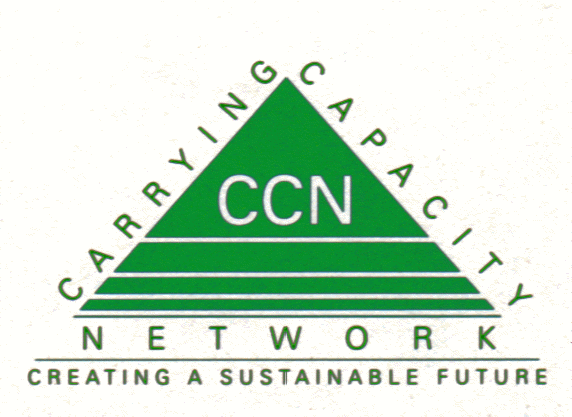|
Home About CCN Publications Support CCN Gift Memberships Archive |
|
CCN's 5 Point Program
WHAT IS CARRYING CAPACITY?A common fallacy is to equate existing and seemingly open or "unused" spaces with the kind of resources and ecologically productive land needed to support human life under modern conditions. In fact, the criterion for determining whether a region is overpopulated is not land area, but carrying capacity. Carrying capacity refers to the number of individuals who can be supported in a given area within natural resource limits, and without degrading the natural social, cultural and economic environment for present and future generations. The carrying capacity for any given area is not fixed. It can be altered by improved technology, but mostly it is changed for the worse by pressures which accompany a population increase. As the environment is degraded, carrying capacity actually shrinks, leaving the environment no longer able to support even the number of people who could formerly have lived in the area on a sustainable basis. No population can live beyond the environment's carrying capacity for very long. The average American's "ecological footprint" (the demands an individual endowed with average amounts of resources, ie, land, water, food, fiber, waste assimilation and disposal, etc. puts on the environment) is about 12 acres, an area far greater than that taken up by one's residence and place of school or work and other places where he or she is. We must think in terms of "carrying capacity" not land area. The effects of unfettered population growth drastically reduce the carrying capacity in the United States. |
Support Carrying Capacity Network
Name: Address: City: State: Zip Code: Donations (check one): $1000 Patron $500 Benefactor $250 Sponsor $100 Major donor $40 Sustaining Membership $25 Membership $20 Senior/Student Membership Other To support our efforts AND help educate new activists, consider visiting our Gift Membership registry today! Your donations are tax-deductable to the extent allowed by law. The content of this website--graphics, text and other elements--is ©2001 by Carrying Capacity Network, and may not be reprinted or retransmitted in whole or in part without the expressed written consent of the publisher.
|
Support CCN! Our efforts cost money, and only you can help. Start by making a secure donation today. New ! Use FirstGov to contact your representatives in Congress, and track their records on issues vital to national sustainability:
Use
FirstGov to search for current news on pertinent legislation:
National
Board of Advisors |

